If you are like us, then you don’t know where to start when it comes to other reading apart from farming magazines.
However, there is so much information out there that can help us understand our businesses, farm better and
understand the position of non-farmers.
We have listed a few more books you might find interesting, challenge the way you currently think and help you farm better.
Teaming with Microbes: The Organic Gardener’s Guide to the Soil Food Web
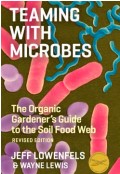
Smart gardeners know that soil is anything but an inert substance. Healthy soil is teeming with life not just earthworms and insects, but a staggering multitude of bacteria, fungi, and other microorganisms. When we use chemical fertilizers, we injure the microbial life that sustains healthy plants, and thus become increasingly dependent on an arsenal of artificial, often toxic, substances. But there is an alternative to this vicious cycle. We can garden in a way that strengthens the soil food web the complex world of soil-dwelling organisms whose interactions create a nurturing environment for plants. “Teaming with Microbes” extols the benefits of cultivating the soil food web. First, it clearly explains the activities and organisms that make up the web.
Next, it explains how gardeners can cultivate the life of the soil through the use of compost, mulches, and compost tea. The revised edition updates the original text and includes two completely new chapters on mycorrhizae (beneficial associations fungi form with green-leaved plants) and archaea (single-celled organisms once thought to be allied to bacteria). With Jeff Lowenfels’ help, everyone from devotees of organic gardening techniques to weekend gardeners who simply want to grow healthy, vigorous plants without resorting to chemicals can create rich, nurturing, living soil.
The Omnivore’s Dilemma: A Natural History of Four Meals
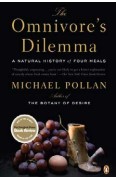
For the past twenty years, Michael Pollan has been writing about the places where the human and natural worlds intersect: food, agriculture, gardens, drugs, and architecture. His book The Omnivore’s Dilemma, about the ethics and ecology of eating, was named one of the ten best books of 2006 by the New York Times and the Washington Post. He is also the author of In Defence of Food, The Botany of Desire, A Place of My Own and Second Nature, and the upcoming Food Rules: An Eater’s Manual.
The Hidden Half of Nature: The Microbial Roots of Life and Health
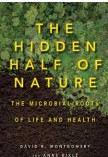
The Hidden Half of Nature lays out the astonishing reality we’ve been missing in the soil beneath our feet and right inside our bodiesour world depends on a foundation of invisible life. Montgomery and Bikle share a captivating story of the least-loved part of nature, taking readers through major milestones in agriculture and medicine to untangle our uneasy relationship with microbes. From the challenge of turning their barren Seattle lot into a flourishing garden through Bikle’s struggle with a surprise cancer diagnosis, the authors discover the power nature’s smallest creatures wield over our lives. Stunning parallels in the relationships that microbes develop with plant roots and the human gut reveal ways that farmers can restore degraded fields and doctors can reverse the modern epidemic of chronic diseases. For in cultivating the beneficial microbes that make soil fertile and keep us healthy, we can suture rifts never meant to be.
The Diet Myth: The Real Science Behind What We Eat

Why do most diets fail? Why does one person eat a certain meal and gain weight, while another eating the same meal loses pounds? Why, despite all the advice about what to eat, are we all still getting fatter? The answers are much more surprising – and fascinating – than we’ve been led to believe. The key to health and weight loss lies not in the latest fad diet, nor even in the simple mantra of ‘eat less, exercise more’, but in the microbes already inside us. Drawing on the latest science and his own pioneering research, Professor Tim Spector demystifies the common misconceptions about fat, calories, vitamins and nutrients. Only by understanding what makes our own personal microbes tick can we overcome the confusion of modern nutrition, and achieve a healthy gut and a healthy body.
Small Is Beautiful: A Study of Economics as if People Mattered
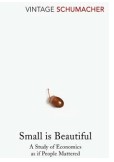
How does our economic system impact the way we live? Does it really affect what we truly care about? Oxford economist E. F. Schumacher provides an enlightening study of our economic system and its purpose, challenging the current state of excessive consumption in our society. Offering a crucial message for the modern world struggling to balance economic growth with the human costs of globalisation, Small Is Beautiful puts forward the revolutionary yet viable case for building our economies around the needs of communities, not corporations.
Food in History
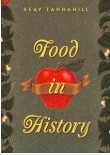
An enthralling world history of food from prehistoric times to the present. A favorite of gastronomes and history buffs alike, Food in History is packed with intriguing information, lore, and startling insights– like what cinnamon had to do with the discovery of America, and how food has influenced population growth and urban expansion.
The Englishman’s Food: Five Centuries of English Diet
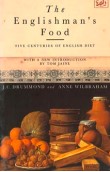
Medieval gardens; cookshops; spices; ale, beer, wine and spirits; the food of peasants, labourers, townspeople, the wealthy, the poor and the country gentleman; fish, meat and game; the feeding of infants, children; dairy products; vitamins, proteins, fat and fibre; the adulteration of food; the four bottle man; bread; poaching; tea, coffee and chocolate; food in schools and institutions; sugar and sweetmeats; root crops; the agricultural revolution; the importance of ‘white meats’, the vegetarian diet; menus and recipes. . . The Englishman’s Food was first published in 1939, fully revised in 1957 and now appears with a new updating introduction. A ground-breaking book, it is a fascinating and authoritative survey of food production, consumption, fashions and follies over a period of five hundred years. Reprinted with a new introduction by food editor Tom Jaine.
Green and Prosperous Land: A Blueprint for Rescuing the British Countryside

News about Britain’s wildlife and ecosystems tends to be grim. In Green and Prosperous Land, Oxford economist and Natural Capital Committee chair Dieter Helm shares his radical but tangible plan for positive change. This pragmatic approach to environmentalism includes a summary of Britain’s green assets, a look towards possible futures and an achievable 25- year plan for a green and prosperous country. The bold generational plan assesses the environment as a whole, explains the necessity of protecting and enhancing our green spaces and offers a clear, financially sound strategy to put Britain on a greener path. Helm’s arguments expose the economic inefficiencies in our environmental policies and thus highlight the need for change. Leaving behind the current sterile and ineffective battle between the environment and the economy, this revolutionary plan champions the integration of the economy and the environment together to deliver sustainable, eco-friendly economic growth. There is hope, and there is time, but we must act now.